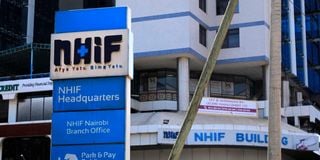NHIF failed patients requiring surgery. Here’s what the new health fund needs to do

The NHIF building in Nairobi.
What you need to know:
- Besides the scope of the amounts awarded based on the actual need, SHA will also need to expedite the turnaround time not only in pre-authorisation approvals but the settlement of claims from providers.
- SHA may consider enlisting a panel of experts for peer review in relevant cases. The current model of NHIF peer review is not clear.
Christine* has rectal cancer. She presented with impending bowel obstruction. Besides taking a biopsy, the evaluation of this type of cancer needs three scans: MRI of the pelvis for local staging, CT scan of the abdomen and chest for distant staging.
After assessing the biopsy report and the scans, my colleagues and I agreed that she needed radiation before surgery. This would help shrink the size of the cancer and ensure that as a surgeon, I could remove the cancer with clear margins. The practice is that after such treatment, another scan needs to be done to assess response before the major surgery. And this is where her problem started.
She had already exhausted her scans limit. Then came the time for surgery. Excision of rectal cancer is special in that one has to take care to remove the whole tumour while still preserving the gate valves of stool called sphincters. In case these sphincters are injured, the patient will have no option but to live with stool incontinence. To curb this, surgeons convert the procedure to something called abdominoperineal resection, a highly demanding procedure where the whole rectum and anus is removed and the asshole stitched closed. The stool is then diverted to the abdominal wall through a neo-anus called a colostomy. Patients with colostomy have to contend with using specialised receptacles called colostomy bags that are attached to this neo anus to collect the stool. Completely life-changing!
Luckily, the biomedical industry has come up gadgets that enable surgeons to operate close to the sphincter and still rejoin the bowel while preserving a continent stooling mechanism and avoiding a permanent colostomy. The gold standard by any means.! And this is where the second problem with Christine* was. The National Health Insurance Fund (NHIF) amount awarded for this procedure ("anterior resection of the rectum") is Sh110, 000. This is supposed to cover the cost of surgery, all consumables and other attendant costs for a patient who will spend approximately a week in hospital. The special gadgets to make us avoid a permanent colostomy (called staplers) will cost around Sh100,000. For Christine, a single mother living with HIV, raising Sh100, 000 was not easy. But it was the right thing to do.
"'Ilibidi niulize kanisa wanichangie' (I was forced to request the church to fundraise for me)," she told me during my post-operative review, adding that she had to move to a cheaper neighbourhood to cut down on rent in an effort to raise the money.
It is these very challenges in health financing that any social insurance must aim to cure. As the country prepares to transition to Social Health Authority (SHA), these are some of the issues we hope to be addressed. Besides the scope of the amounts awarded based on the actual need, the authority will also need to expedite the turnaround time not only in pre-authorisation approvals but the settlement of claims from providers.
In addition, SHA may consider enlisting a panel of experts for peer review in relevant cases. The current model of NHIF peer review is not clear. Sometimes NHIF will ask for peer review from the public sector for patients who may have been driven to private sector because of waiting time in public facilities, with a diagnosis and a plan of management already recommended.
As if that is not enough, in set-ups outside major cities, some private and faith-based facilities may have superior expertise in some cases. There are regions where the only line specialist is found in a private facility.
How can expert peer review be sought where no expertise exists? Article 43 of the Constitution guarantees every Kenyan the right to the highest attainable standard of healthcare. If the highest standard of health requires Christine to have four scans in a year and a special implant, this should be allowed on a case by case basis, and not met with ‘stick to the contract amount’ mantra. This way, SHA will also establish the true cost of care and unearth other hidden costs and their drivers. If SHA decides to continue with the rates as per NHIF, it will be a great disservice to many Kenyans with surgical needs.
Dr Aruyaru is a consultant general surgeon, chief medical officer at PCEA Kikuyu Hospital and the secretary-general of the Surgical Society of Kenya




